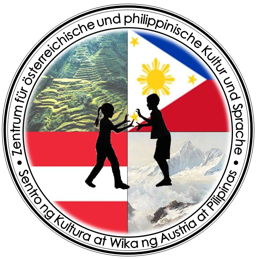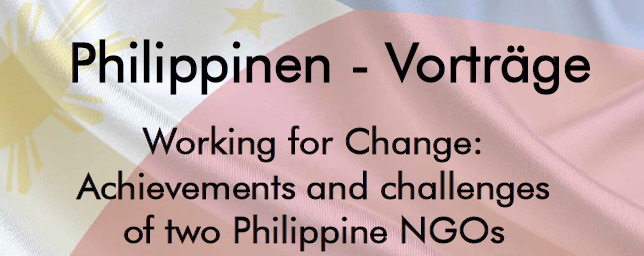Summary by Christiane Gotz
„Working for Change: Achievements and challenges of two Philippine NGOs“
On December 4th, 2018 the University of Vienna opened its doors again for the second lecture of the series Philippinen-Vorträge. The lecture took place at the NIG (Neues Institutsgebäude) and was organised in cooperation with the Department of Social and Cultural Anthropology, Sentro and the DKA Austria (Dreikönigsaktion – Hilfswerk der Katholischen Jungschar).
The main goal of the program was to introduce two Mindanao-based NGOs with whom the DKA Austria has been building a long-term development cooperation. The organisers were delighted to invite representatives of Agro-Eco Philippines and Child Alert Mindanao to give an insight into the work of their organisations.
The lecture started with opening remarks by Prof. Dr. Bernhard Hadolt, Senior Lecturer at the Department of Social and Cultural Anthropology who welcomed the audience in the full lecture room.
The first presentation was held by Bernardo Mondragon, Executive Director of the NGO Child Alert Mindanao, titled “Rights and protection of vulnerable and marginalized children in Davao, Mindanao”.
He described the significance of children in Philippine society, emphasising that children are of high importance for Filipino families and yet it is the family settings where most abuse and maltreatment against children takes place. The expert explained how experience of abuse in the home increases the risk of children to experience abuse from their peers, other members of their families and other people they socialize with. According to Mr. Mondragon, children who have been subjected to maltreatment may in turn use violence against peers, partners and other people as well. His NGO has experienced that child protection can be a complex challenge, especially in communities with a high poverty rate.
The second NGO was introduced by Geonathan T. Barro, Executive Director of Agro-Eco Philippines. One of their main goal is to promote climate-resilient agriculture. In his presentation “Building sustainable local economies in the Philippines” he highlighted some of the most pressing problems that farming communities are facing and how his organisation is addressing these challenges and which solutions can be provided:
Although the Philippines – and especially Mindanao – are known for being among the top food producers, people and particularly farmers are suffering from “serious hunger incidence” with an alarming percentage of 19,9% compared to Senegal (16,5%) or Ghana (13,9%), according to Mr. Barro.
Agro-Eco aims to educate rural communities about climate change and how conventional farming has contributed a lot to it. The NGO has been working to build resilient farming communities and sustainable local economies to address climate change, hunger and rural poverty. Their research on crops that are more resilient towards climate disasters has proven to be useful to small-scale farmers who needed sustainable strategies on how to protect their crops and therefore their livelihood. Especially strengthening organic agriculture-based social enterprise at the local level can liberate more farmers from poverty and can furthermore provide consumers with affordable, adequate and easy access to organic food directly from their farmers.
Following the two presentations the floor was opened to questions from the audience. The presenters later mentioned that they were positively surprised that their work and the issues they discussed garnered such vivid interest among the Austrian students and the people attending the event.
Sentro asked some of the attendants about their impression of the event:
Thelma Hugo Gotz (retired, former employee at the United Nations Industrial Development Organisation): „I was especially touched by the fact that Austrian organisations such as the DKA are cooperating with local Philippine NGOs in order to promote advocacy activities and sustainable development. As a Filipina whose family derives from rural Batangas, I especially admire the work of the hard-working farmers of Agro-Eco and their efforts to enhance the living conditions of rural communities in the Philippines. I hope that their projects can be a model for many more communities all over the Philippines.“
Mike Saycon (PhD candidate, University of Vienna, former employee at UNICEF Philippines): „Very enlightening presentations on issues that may not be too familiar with Austrians and Filipinos living in Austria, but they were certainly very relevant especially to the students studying in the field of sociology, anthropology, social work and policy. It was also a good starting point to discuss such issues in a very personal way — especially because Bernie and Geonathan are actually the ones running their programmes. However, I wished there was more time for both presenters to elaborate on their work; and respond to questions, especially from those who are not familiar with the political landscape in the Philippines. It was such a good exchange of perspectives, but time was a bit short. Overall, I hope to see more of such an event in the future.“
The next event of the series Philippinen-Vorträge that will take place this summer semester is currently in its planning phase. Sentro was also asked to participate in the presentation of the Philippinen Handbuch on May 3rd 2019. The event will start at 6pm at the Uni Wien Institut für Geographie und Regionalforschung, Universitätsstraße 7/4, Hörsaal 4C.



